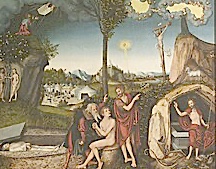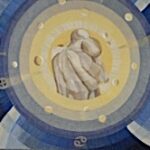Illustration: The Law and the Gospel by Lucas Cranach the Elder (1529);
Moses and Elijah point the sinner to Jesus for salvation.
JOHN PAUL II – GENERAL AUDIENCE – Wednesday 26 January 2000
“not for lack of wonders, but for lack of wonder”
Dear Brothers and Sisters,
1. “How much to be desired are all his works, and how glorious they are to behold!…
He has made nothing incomplete…. Who can have enough to behold his glory?
Though we speak much we cannot reach the end, and the sum of our words is: “He is the All’.
Where shall we find the strength to praise him? He is greater than all his works…” (Sirach 42: 22, 24-25; 43: 27-28).
With these words of wonder, Sirach, a biblical sage, contemplated the splendor of creation and sang God’s praises.
It is a tiny piece of the thread of contemplation and meditation which runs through that runs through the whole of Scripture, from the first lines of Genesis when creatures, summoned by the mighty word of the Creator, emerge from the silence of nothingness.
“God said, “Let there be light’; and there was light” (Genesis 1: 3).
In this part of the first account of creation the Word of God is already seen in action; John will say of Him: “In the beginning was the Word … the Word was God … all things were made through him, and without him was not anything made that was made”(John 1: 1-3).
Paul will emphasize in the hymn in the Letter to the Colossians that “in him [Christ] all things were created, in heaven and on earth, visible and invisible, whether thrones or dominions or principalities or authorities – all things were created through him and for him. He is before all things, and in him all things hold together” (Coossiansl 1: 16-17).
But from the very first moment of creation the Spirit also seems to be foreshadowed:
“the Spirit of God was moving over the face of the waters” (Genesis 1: 2).
The glory of the Trinity – we can say with Christian tradition – is resplendent in creation.
2. In the light of Revelation we can see how the creative act is primarily attributed to the “Father of lights, with whom there is no variation or shadow of change” (James 1: 17).
He illuminates the whole horizon, as the Psalmist sings: “O Lord, our Lord, how glorious is your name over all the earth! You have exalted your majesty above the heavens” (Ps 8: 2).
God “made the world firm so that it would not be moved” (Ps 96:10), and in the face of nothingness, symbolised by the chaotic waters that raise their voices, the Creator stands up and gives firmness and security: “The waters have risen, O Lord, the waters have raised their voice, the waters have raised their roar. Mightier than the thunder of many waters, mightier than the waves of the sea, the Lord on high is mighty” (Ps 93:3-4).
3. In Sacred Scripture creation is also often linked to the Word of God which breaks in and acts: “ By the word of the Lord the heavens were made, and all their host by the breath of his mouth…. He spoke, and it was done; he commanded, and it was done…. He sends his command to the earth; his word is swift” (Ps 33: 6, 9; 147: 15).
In the wisdom literature of the Old Testament, it is divine wisdom personified that brings forth the universe and carries out the plan that God has in mind (cf. Prv 8: 22-31).
It has been said that John and Paul saw in God’s Word and Wisdom the foreshadowing of the work of Christ, “from whom all things came and for whom we exist” (1 Cor 8: 6), because it is “through [Christ] also [that God] created the world” (Heb 1: 2).
4. At other times Scripture emphasises the role of God’s Spirit in the act of creation: “When you send forth your Spirit, they are created; and you renew the face of the earth” (Ps 104: 30).
This same Spirit is symbolically described as the breath of God’s mouth.
He gives life and consciousness to man (cf. Genesis 2: 7 – Then the Lord God formed man of dust from the ground, and breathed into his nostrils the breath of life; and man became a living being), and brings him back to life in the resurrection, as the prophet Ezekiel proclaims in a powerful passage where the Spirit is at work breathing life into dry bones
(Ezekiel 37: 1-14 The hand of the Lord was upon me, and he brought me out by the Spirit of the Lord, and set me down in the midst of the valley;[a] it was full of bones.[b] 2 And he led me round among them; and behold, there were very many upon the valley;[c] and lo, they were very dry. 3 And he said to me, “Son of man, can these bones live?” And I answered, “O Lord God, thou knowest.” 4 Again he said to me, “Prophesy to these bones, and say to them, O dry bones, hear the word of the Lord. 5 Thus says the Lord God to these bones: Behold, I will cause breath[d]to enter you, and you shall live. 6 And I will lay sinews upon you, and will cause flesh to come upon you, and cover you with skin, and put breath[e] in you, and you shall live; and you shall know that I am the Lord.”
7 So I prophesied as I was commanded; and as I prophesied, there was a noise, and behold, a rattling; and the bones came together, bone to its bone. 8 And as I looked, there were sinews on them, and flesh had come upon them, and skin had covered them; but there was no breath in them. 9 Then he said to me, “Prophesy to the breath, prophesy, son of man, and say to the breath,[f] Thus says the Lord God: Come from the four winds, O breath,[g] and breathe upon these slain, that they may live.” 10 So I prophesied as he commanded me, and the breath came into them, and they lived, and stood upon their feet, an exceedingly great host.
11 Then he said to me, “Son of man, these bones are the whole house of Israel. Behold, they say, ‘Our bones are dried up, and our hope is lost; we are clean cut off.’ 12 Therefore prophesy, and say to them, Thus says the Lord God: Behold, I will open your graves, and raise you from your graves, O my people; and I will bring you home into the land of Israel. 13 And you shall know that I am the Lord, when I open your graves, and raise you from your graves, O my people. 14 And I will put my Spirit within you, and you shall live, and I will place you in your own land; then you shall know that I, the Lord, have spoken, and I have done it, says the Lord.”).
This same breath quenches the waters of the sea at the time of Israel’s exodus from Egypt (cf. Ex 15: 8, 10). Again the Spirit regenerates the human creature, as Jesus will say in his night conversation with Nicodemus:
“Truly, truly, I say to you, unless one is born of water and the Spirit, he cannot enter the kingdom of God.
That which is born of the flesh is flesh, and that which is born of the Spirit is spirit“ (Jn 3: 5-6).
5. In contemplating the glory of the Trinity in creation, then, man must contemplate, sing and rediscover wonder. In today’s society, people are becoming indifferent “not for lack of wonders, but for lack of wonder” (G. K. Chesterton).
For the believer, to contemplate creation is also to hear a message, to listen to a paradoxical and silent voice, as the “Psalm of the Sun” suggests: “The heavens declare the glory of God; and the firmament proclaims his handiwork. Day after day pours forth speech, and night after night declares knowledge. There is no speech, there are no words; their voice is not heard; yet their voice goes out through all the earth, and their words to the end of the world” (Ps 19: 1-5).
Nature thus becomes a gospel which speaks to us of God: “From the greatness and beauty of created things comes a corresponding perception of their Creator” (Wis 13: 5).
Paul teaches us that “from the creation of the world His [God’s] invisible qualities, that is, his eternal power and divinity, are clearly seen, being understood by what has been made” (Rom 1: 20).
But this capacity for contemplation and knowledge, this discovery of a transcendent presence in created things must also lead us to rediscover our kinship with the earth, to which we have been linked since our own creation (cf. Genesis 2: 7).
This is precisely what the Old Testament wished for the Hebrew Jubilee, when the land was at rest and man ate what the fields spontaneously gave him (cf. Lv25: 11-12).
If nature is not violated and degraded, it becomes once again man’s sister.

